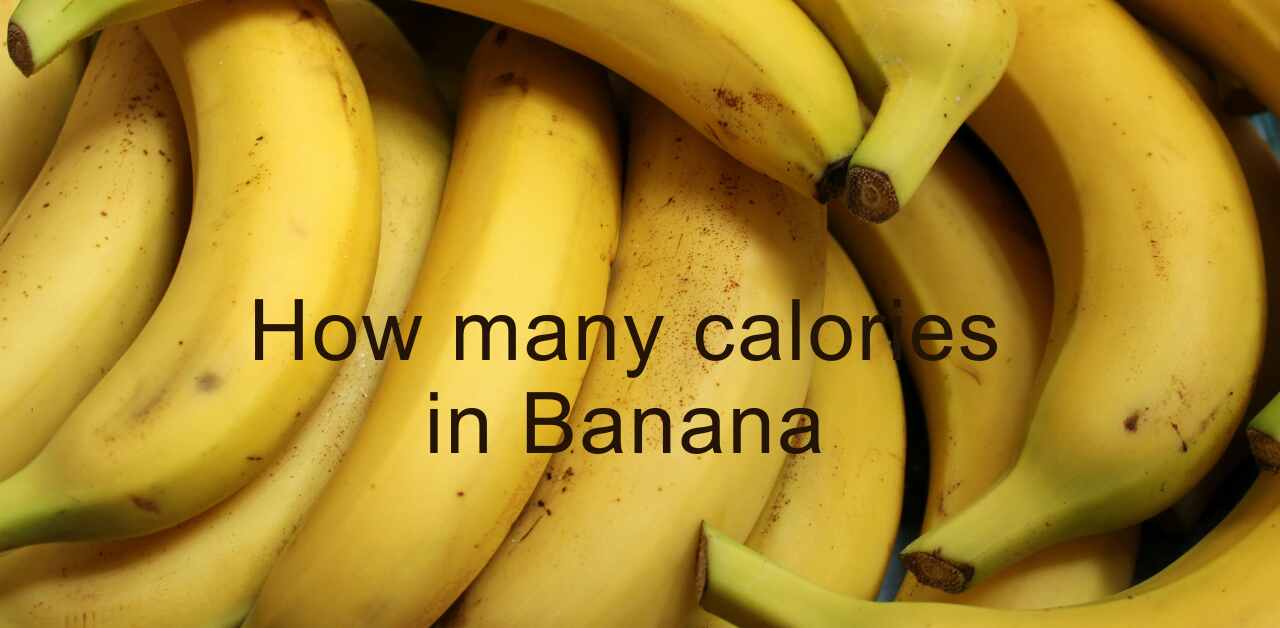How many calories are in a banana.Explore the nutritional content of bananas, including their calorie count and health benefits. Let us know how this delicious fruit adds nutrition to our and your diets. Frequently asked questions were answered.

The Caloric Content of Bananas:
A medium-sized banana typically contains around 105 calories, making it a relatively low-calorie fruit. The caloric content may vary slightly depending on the size and ripeness of the banana, but this serves as a useful benchmark. Despite their modest calorie count, bananas are nutritionally dense, packing a punch of essential nutrients.
Macronutrients in bananas:
Bananas are rich in carbohydrates, primarily in the form of natural sugars such as fructose, glucose, and sucrose. These sugars provide a quick and easily digestible source of energy, making bananas a fantastic choice for a pre- or post-workout snack.
In addition to carbohydrates, bananas are also a good source of dietary fiber. Fiber aids in digestion, promotes a feeling of fullness, and supports a healthy gut. It can also help regulate blood sugar levels and contribute to heart health.
Bananas contain a negligible amount of fat, making them a great choice for those looking to maintain a low-fat diet.
Vitamins and Minerals in Bananas:
Bananas are packed with essential vitamins and minerals that contribute to overall health and well-being. They are particularly rich in vitamin C, an antioxidant that supports the immune system and promotes healthy skin. Moreover, bananas are an excellent source of vitamin B6, which plays a crucial role in metabolizing carbohydrates and protein, as well as supporting brain health and cognitive function. Minerals found in bananas include potassium, magnesium, and manganese. Potassium is essential for maintaining healthy blood pressure levels and supporting proper muscle function. Meanwhile, magnesium helps with bone health and promotes relaxation, while manganese contributes to antioxidant defenses.
Other nutritional benefits:
Beyond their impressive macronutrient and micronutrient profiles, bananas also contain various bioactive compounds, such as dopamine and catechins. Dopamine is a neurotransmitter that contributes to feelings of pleasure and satisfaction, which might explain why bananas are often associated with improved mood and stress relief. Catechins are antioxidants that have been linked to a reduced risk of certain chronic diseases.
Uses of bananas:
- Nutrient-Rich Snack: Bananas are a convenient and nutrient-dense snack, providing essential vitamins, minerals, and dietary fiber.
- Energy Boost: High in natural sugars like fructose, glucose, and sucrose, bananas offer a quick and sustained energy source for physical activities.
- Post-Workout Recovery: Consuming a banana after exercise can help replenish glycogen stores and aid in muscle recovery due to its carbohydrate content.
- Digestive Health: The dietary fiber in bananas supports healthy digestion and promotes regular bowel movements.
- Heart Health: Bananas are an excellent source of potassium, which helps regulate blood pressure and supports heart health.
- Mood Enhancer: Rich in dopamine, bananas are known to boost mood and promote feelings of happiness and relaxation.
- Hangover Cure: Bananas can help alleviate hangover symptoms due to their natural sugars and replenishing nutrients.
- Natural Sweetener: Mashed bananas can serve as a healthy alternative to sugar in various recipes, such as smoothies, pancakes, and baked goods.
- Skincare Benefits: Applying mashed bananas to the skin can help moisturize and nourish, leaving it soft and supple.
- Environmentally Friendly Packaging: Bananas come with their biodegradable, natural packaging – their peel, which reduces the need for additional plastic waste.
Conclusion:
In conclusion, bananas are a delicious and nutritious fruit that provides a wealth of health benefits. With only around 105 calories in a medium-sized banana, it’s a perfect option for those seeking a wholesome snack to fuel their day. Alongside their low-calorie content, bananas offer an abundance of vitamins, minerals, and other essential nutrients that contribute to overall well-being.
Frequently asked questions (FAQ) along with their answers:
Q: How many calories are in a banana?
A medium-sized banana contains approximately 105 calories.
Q: Are bananas a good source of potassium?
A: Yes, bananas are an excellent source of potassium, which supports heart health and helps regulate blood pressure.
Q: Can bananas help with digestion?
A: Yes, bananas are rich in dietary fiber, which promotes healthy digestion and regular bowel movements.
Q: Are bananas a suitable snack for athletes and workouts?
A: Absolutely! Bananas provide a quick and sustained energy boost, making them an ideal pre- or post-workout snack.
Q: Do bananas have any nutritional benefits for skin health?
A: Yes, applying mashed bananas to the skin can help moisturize and nourish it, leaving it soft and supple.
Q: Are bananas a good mood enhancer?
Yes, bananas contain dopamine, a neurotransmitter that can boost mood and promote feelings of happiness and relaxation.
Q: Can bananas help with hangover symptoms?
Yes, bananas’ natural sugars and replenishing nutrients can aid in alleviating hangover symptoms.
Q: Can bananas be used as a natural sweetener in recipes?
A: Absolutely! Mashed bananas can serve as a healthy alternative to sugar in various recipes, such as smoothies, pancakes, and baked goods.
Q: Do bananas have any environmental benefits?
Yes, bananas come with their biodegradable, natural packaging—their peel, which reduces the need for additional plastic waste.
Q: Are there any health risks associated with consuming bananas?
A: For most people, bananas are safe to eat. However, individuals with latex allergies may experience cross-reactivity and should be cautious. Remember, while bananas offer numerous health benefits, moderation and a balanced diet are key to overall well-being.